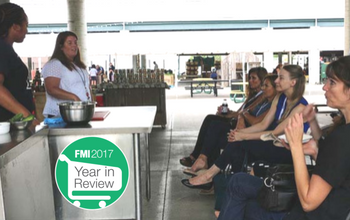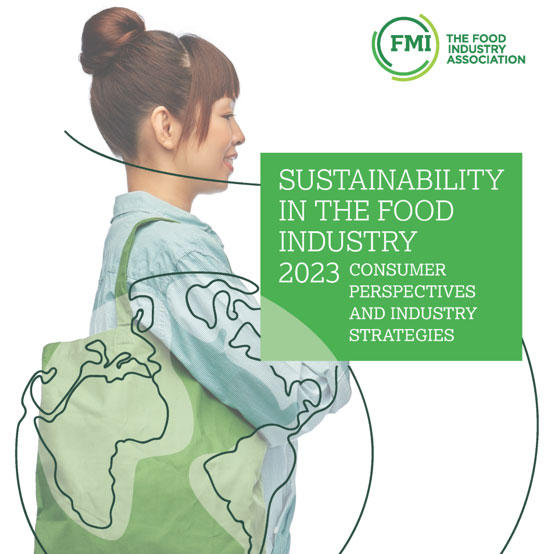By: Andy Harig, Senior Director, Tax, Trade & Sustainability, Food Marketing Institute

FMI held its first Sustainability Summit in Minneapolis during the summer of 2008; this year’s event – held in Nashville under the auspices of the FMI-GMA Trading Partner Alliance (TPA) – marked the end of a full decade of work and focus on the issue. If we compare the agenda for that original, low-key affair with that of 2017, it is hard to believe the conference was devoted to the same subject. The definition of sustainability has evolved enormously over the past decade, expanding into the broader concept of corporate social responsibility (CSR). When we talk today about sustainable supply chains, it doesn’t just cover the environmental and energy issues at the core of FMI’s early work on the topic, but also areas like human/labor rights, sustainable sourcing, animal welfare, and food waste.
Food retailers have worked diligently to keep pace with this evolving definition, and FMI’s efforts to support the industry’s leadership reflects the diversity of the topics covered. The Sustainability Executive Committee (SEC) – comprised of sustainability professionals from over 20 FMI member companies – ventured into broader territory in 2017 and played an important role in two significant efforts:
-
The TPA’s establishment of uniform date labeling language; and
-
The development of the FMI Board Broiler Welfare Statement.
The fact that the SEC shared in these efforts with members of FMI’s Food Safety, Supply Chain and Communications Committees reflects the changes we’ve seen in many of our companies and in the broader business community. Sustainability can no longer stand as a solitary silo within a company; it demands collaboration and commitment across all departments. The expanding breadth of the issue can also be seen in the diverse set of organizations that asked to learn about the industry’s stance and role in sustainability. FMI staff gave presentations on CSR topics at conferences hosted by the Society for Nutrition Education and Behavior, the International Food Technologists, and ProFoodTech, to cite just a few.
Of course, addressing the ongoing challenge of food waste remains at the core of FMI’s sustainability efforts and in 2017, we continued our collaboration with the Grocery Manufacturers Association and National Restaurant Association as founders of the Food Waste Reduction Alliance (FWRA). The highlight of this year’s FWRA agenda was an April food waste workshop attended by more than 30 companies at the Greater Chicago Area Food Bank. The eight-hour session included in-depth case studies for all three industries before breaking out into in-depth industry-focused discussion groups that led the participants to a host of new ideas to take back to their companies. This workshop was so successful that we hope to repeat it in 2018.
There is no doubt that keeping up with the expanding definition of sustainability has challenged the industry and will continue to do so for the foreseeable future. But the energy and engagement of FMI’s membership exemplified Peter Drucker’s claim that, “Management is doing things right; leadership is doing the right things.”


 Industry Topics address your specific area of expertise with resources, reports, events and more.
Industry Topics address your specific area of expertise with resources, reports, events and more.
 Our Research covers consumer behavior and retail operation benchmarks so you can make informed business decisions.
Our Research covers consumer behavior and retail operation benchmarks so you can make informed business decisions.
 Events and Education including online and in-person help you advance your food retail career.
Events and Education including online and in-person help you advance your food retail career.
 Food Safety training, resources and guidance that help you create a company food safety culture.
Food Safety training, resources and guidance that help you create a company food safety culture.
 Government Affairs work — federal and state — on the latest food industry policy, regulatory and legislative issues.
Government Affairs work — federal and state — on the latest food industry policy, regulatory and legislative issues.
 Get Involved. From industry awards to newsletters and committees, these resources help you take advantage of your membership.
Get Involved. From industry awards to newsletters and committees, these resources help you take advantage of your membership.
 Best practices, guidance documents, infographics, signage and more for the food industry on the COVID-19 pandemic.
Best practices, guidance documents, infographics, signage and more for the food industry on the COVID-19 pandemic.
